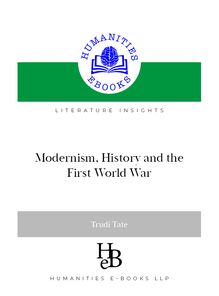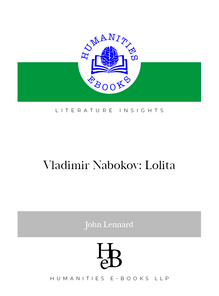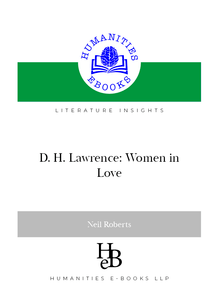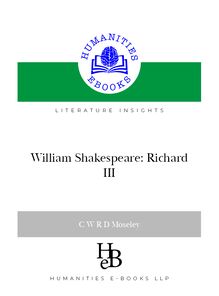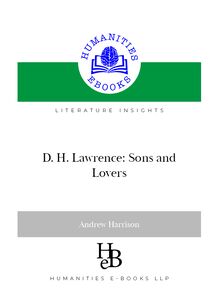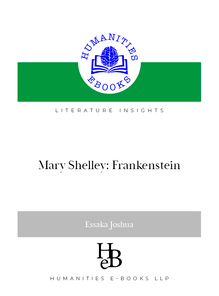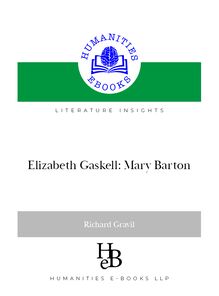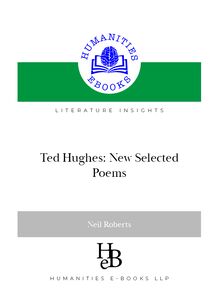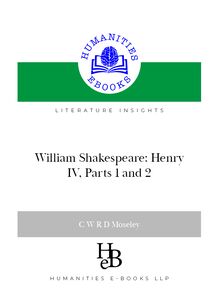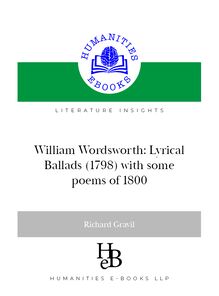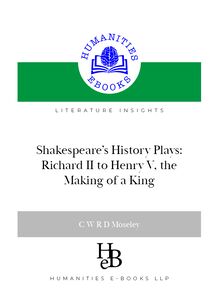-
 Univers
Univers
-
 Ebooks
Ebooks
-
 Livres audio
Livres audio
-
 Presse
Presse
-
 Podcasts
Podcasts
-
 BD
BD
-
 Documents
Documents
-
- Cours
- Révisions
- Ressources pédagogiques
- Sciences de l’éducation
- Manuels scolaires
- Langues
- Travaux de classe
- Annales de BEP
- Etudes supérieures
- Maternelle et primaire
- Fiches de lecture
- Orientation scolaire
- Méthodologie
- Corrigés de devoir
- Annales d’examens et concours
- Annales du bac
- Annales du brevet
- Rapports de stage
La lecture à portée de main
116 pages
English
Découvre YouScribe en t'inscrivant gratuitement
Je m'inscrisDécouvre YouScribe en t'inscrivant gratuitement
Je m'inscris
Obtenez un accès à la bibliothèque pour le consulter en ligne
En savoir plus
En savoir plus
116 pages
English
Obtenez un accès à la bibliothèque pour le consulter en ligne
En savoir plus
En savoir plus

Description
Provides a basis for informed discussion of Richard III, one of Shakespeare's most beautifully-crafted plays, and the issues it raises - which are as ominously relevant to politics and people now as they were when it was new.
Sujets
Informations
| Publié par | Humanities eBooks |
| Date de parution | 11 janvier 2021 |
| Nombre de lectures | 0 |
| EAN13 | 9781847600295 |
| Langue | English |
| Poids de l'ouvrage | 1 Mo |
Informations légales : prix de location à la page 0,0250€. Cette information est donnée uniquement à titre indicatif conformément à la législation en vigueur.
Extrait
space space
Literature Insights General Editor: Charles Moseley
Running Head 1
A Guide to William Shakespeare Richard III
C. W. R. D. Moseley C. W. R. D. Moseley
‘No Vice ever took an audience for such a ride …’
http//www.humanities-ebooks.co.uk
Publication Data
© C W R D Moseley, 2007
The Author has asserted his right to be identified as the author of this Work in ac-cordance with the Copyright, Designs and Patents Act 1988.
Published in 2007 byHumanities-Ebooks.co.uk Tirril Hall, Tirril, Penrith CA10 2JE
Reading and Listening Options
*To use the navigation tools, the search facility, and other features of the Adobe toolbar, this Ebook should be read in default view. *To navigate through the contents use the hyperlinked ‘Bookmarks’ at the left of the screen. *To search, expand the search column at the right of the screen or click on the binocular symbol in the toolbar. *For ease of reading, use <CTRL+L> to enlarge the page to full screen *Use <Esc> to return to the full menu. *Hyperlinks appear in Blue Underlined Text.
Licence and permissions
Purchasing this book licenses you to read this work on-screen and to print one copy for your own use. Copy and paste functions are disabled. No part of this publication may be otherwise reproduced or transmitted or distributed without the prior written permission of both the copyright owner and the publisher. Making or distributing copies of this book constitutes copyright infringement and would be liable to pros-ecution. Thank you for respecting the rights of the author.
ISBN 978-1-84760-029-5
William Shakespeare: Richard III
C. W. R. D. Moseley
Literature Insights. Tirril: Humanities-Ebooks, 2007
A Note on the Author
Dr Moseley is Fellow and Tutor of Hughes Hall, Cambridge, and Director of Studies in English for that College and for St Edmund’s College. He teaches Classical, me-diaeval and Renaissance literature in the English Faculty of the University of Cam-bridge, and is the author of many books and articles, not all in his specialist îelds. He has travelled widely in the Arctic, and is a member of the Arctic Club. He has been elected to Fellowship of the Society of Antiquaries of London and of the Eng-lish Association. He is also a member of the Society for Nautical Research. He is General Editor of the Literature Insights series, to which his contributions will include studies ofThe Tempest, and Shakespeare’s treatment ofHenry IV, to-gether with a companion to all our Renaissance Drama titles:English Renaissance Drama: a Very Brief Introduction to Theatre and Theatres in Shakespeare’s Time.
Contents
A Note on the Author Introduction 1. ‘Jacobethan’ Attitudes 1.1 History and Politics 1.2 The Model of the World 1.3 Free Will and the Fall of Man 1.4 Macrocosm and Microcosm 1.5. The Failure of the Model 2. Theories of Drama History and Tragedy 3. History, Tragedy, and Politics 4. The Sources and their use 5. The Figure of Richard 5.1 Richard and the Morality Vice 5.2 Richard and the machiavel 6. Richard’s Performance 7. Conscience and the King—Some Themes of the Play 7.1 Justice, Vengeance, Revenge 7.2 Time and the Importance of Margaret 8. The Structure of the Play 9. Language, Style and Rhetoric 10. Afterword Appendix:The Text of the Play Further Reading Conceptual Index Hyperlinked Text
Introduction
Elizabethans and Jacobeans expected plays to amuse and divert them. If they failed to do so their authors and the companies they worked for did not make a living in a very cut-throat market. In the new permanent commercial theatres of the later 1 Elizabethan period, attitudes to drama and expectations of itsconventionshad been formed by centuries of religious and ritual drama—the Mystery andMoralityplays. And although by deînition what we see on the stage is not ‘the real thing’, but a representation through illusion, neither that nor its amusement value prevents theatre being a highly self-conscious and serious intellectual pursuit, recognized as such by audiences and playwrights, actors and critics. The profundity of Shakespeare’s con-cerns and their analysis in his plays may be unusual in degree, but those concerns are shared by his fellow-dramatists. This book deals with only one play, but that play is very much part not only of one man’s work with a particular group of actors, but also of a general theatrical culture which was one of the only two mass media of the period, to which everyone more or less went and to which nobody could not have an attitude. (The other was sermon.) I therefore RECOMMEND STRONGLY THAT THIS BOOK BE READ IN CONJUNCTION with myEnglish Renaissance Drama: a Very Brief Introduction to Theatre and Theatres in Shakespeare’s Time(hereafter VBI) in this series. What follows is based in some degree on the assumption that it will be. Those familiar with the background of Elizabethan culture can skip sections1.1 to 2and go straight to the discussion of the play, always bearing in mind the close connection in that society between theatre and politics: theatre provided one of the few spaces where the undiscussable could be discussed through a fable and a large number of people at once could in the ritual space of the theatre face the problems of the real world transmuted into îction. No wonder the authorities were so nervous of the theatres, and keen at the same time to use to their own purposes
No society, or art can work without conventions: briey, an area, or areas, of agreement between author and audience where the referents need not be stated. If you do not know the conventions, you are bound to get things seriously wrong.
1. ‘Jacobethan’ Attitudes
1.1 History and Politics
1 Richard IIIis one of very many ‘Jacobethan’ plays about (mainly English) his-tory. (Shakespeare himself wrote nine before 1600—a quarter of his whole canon of thirty-seven plays, and several others draw subjects from British or Roman history.) Their past fascinated the Elizabethans, who sought in it guidelines for a future that seemed fraught with danger. The old Queen was without a clear heir, and refused to arrange the succession. Her whole reign had seen constant unrest at home and abroad. Although she managed to keep the loyalty of most of her Catholic subjects—after all, the admiral who defeated the Armada in 1588 was Catholic—the religious question was bubbling away like a pressure cooker, and it seemed it could at any time tear the commonwealth of England apart (especially after Pope Pius V in 1570 encouraged good Catholics to conspire against and assassinate Elizabeth). One had only to look at France and the Low Countries to see the havoc caused by religious strife between Catholic and Protestant; there was no guarantee it could not happen in England. Civil war, dynastic or religious, was really possible when the Queen died, and of course eventually in 1642 it came—though not for the expected reasons. The Elizabethans’ fear of this most terrible of conicts was reasonable: recent English history included a century of piratical nobles wrangling over the crown, and the wrong done to ‘this noble realm of England’ is the text to which nearly all chronicle or history plays of the period are glosses. The orotund opening sentence of Hall’sUnion of the Noble and Illustre Families of Lancastre and York(1548), one of Shakespeare’s sources for Richard III,expresses the revulsion:
What mischief hath insurged in realms by intestine division, what depopu-lation hath ensued in countries by civil dissension, what detestable murther hath been committed in cities by separate factions, and what calamity hath ensued in famous regions by domestic discord and unnatural controversy,
By this ugly word I mean the years between, say, 585 and 65: Elizabeth died in 603 to be suc-ceeded by James of Scotland.
Richard III 8
Rome hath felt, Italy can testify. France can bear witness, Beaume [Bohemia] can tell, Scotland can write, Denmark can show, and especially this noble realm of England can apparently declare and make demonstration.
Nowadays history’s social and political importance of is easily forgotten, when the subject seems, for most, to have been reduced from the high philosophic search for humane understanding to gossip about grandparents, but George Orwell’s1984 expresses chillingly an idea which every generation until our own would have under-stood: ‘Who controls the past controls the present; who controls the present controls the future.’ The seriousness with which totalitarian regimes, whether îctional or as regrettably real as Hitler’s Germany or Soviet Russia, take the past reminds us of its importance in forming social and moral values and acting as a yardstick for the present. The Jacobethans were not merely curious, or wanting a romp through their more successful heroes’ glamorous exploits; they sought to understand and evaluate the present, and history plays reached more people more often than any other form of historical discussion. The phenomenon of these plays’ existence is a historical and cultural fact of major consequence. No attempt to understand the nature and morality of human societies can avoid assuming some theory of the nature of man and the world he lives in. The Greeks and Romans saw history as a series of cycles, where ultimately all returned to its beginning and started again; the Jews, followed by the Christians, introduced the idea that history was linear, where God Himself intervenes, which would one day come to an emphatic end when the meaning of all would be made plain, as the last paragraph of a novel îts the last piece of stone into the arch. (The Marxists happily took over the idea of history as a progress to a goal, but ditched the spiritual and theological aspects that gave that goal inînitely extensible meaning.) It is, of course, the Christian understanding of human life on earth we have to assume for the read-ing of Renaissance literature of any kind, and Christian thought heavily inuences the model of the universe, which accounted for all the known scientiîc facts at that time, that had developed over many centuries. This point is very important, for many people attempt what is impossible: to understand the literature, art and politics of the Renaissance—or any other period—with only the sketchiest knowledge of a) what Christians believe and b) the Bible. For the Bible is, with the remains of Classical literature, the basis of Western culture and values, constantly fertilizing the minds of succeeding generations, providing values that really do affect men’s behaviour. Any student expecting to be taken seriously, therefore, should get themselves a Bible and read it. We also do our fathers great disservice if we do not bother to înd out what
Richard III
understanding of the nature of Man in Christianity it was for which andbbyywhich they lived, died—and killed.
1.2 The Model of the World
The world model can be summed up in the word ‘Degree’—an order or rank in which everything in the universe, from the highest seraph to the lowliest element, had a spe-ciîc place, a speciîc job which only it could do for the glory of God. Virtue, basi-cally, consisted in doing that job, working with the grain of the universe, singing in harmony with it. The idea, current for several centuries and still leaving fossils in our language and thought, is most powerfully expressed in 1.iii ofTroilus and Cressida:
The heavens themselves, the planets, and this centre, Observe degree, priority, and place, Insisture, course, proportion, season, form, Ofîce, and custom, in all line of order. And therefore is the glorious planet Sol In noble eminence enthroned and sphered Amidst the other, whose med’cinable eye Corrects the ill aspects of planets evil. And posts like the commandment of a king, Sans check, to good and bad. But when the planed Is evil mixture to disorder wander, What plagues and what portents, what mutiny, What raging of the sea, shaking of earth, Commotion in the winds, frights, changes, horrors, Divert and crack, rend and deracinate The unity and married calm of states Quite from their future! O, when degree is snaked, Which is the ladder to all high designs, The enterprise is sick. How could communities, Degrees in schools, and brotherhoods in cities, Peaceful commerce from dividable shores, The primogeniture and due of birth, Prerogative of age, crowns, sceptres, laurels, But by degree stand in authentic place? Take but degree away, untune that string,
Richard III 0
And hark what discord follows! Each thing meets In mere oppugnancy. The bounded waters Should lift their bosoms higher than the shores, And make asop of all this solid globe; Strength should be lord of imbecility, And the rude son should strike his father dead; Force should be right, or, rather, right and wrong – Between whose endless jar justice resides – Should lose their names, and so should justice too. Then everything includes itself in power. Power into will, will into appetite, And appetite, an universal wolf, So doubly seconded with will and power. Must make perforce an universal prey, And last eat up himself. This speech assumes a universe with a spherical earth at the centre of a series of concentric spheres, each dominated by living beings whose physical manifestation we perceive as the planets. Those planets move in a great harmonious dance through the heavens, making the mathematical music of the spheres, inaudible to the ears of those clothed in this “muddy vesture of decay’, as Lorenzo tells Jessica inThe Merchant 1 of Venice5.i. They pour down on the earth the combined power of their ‘inuence’.The mainspring of the universe is love: the love of God that calls it into existence, the love that his creatures return to him and give to each other. The universe is utterly hierarchical, in a ladder of degree that reaches up to the angels who sing around the throne of God Himself. At the bottom is mere physical matter, composed of its four 2 elements , devoid of life and merely existing. Then come those creatures with the power only to grow and reproduce: the plants, which have a ‘vegetable’ soul. Next are creatures that are not just alive, but have senses: the animals. Man combines these two souls, ‘Sensible’ and ‘Vegetable’, with a third, the Rational—the ability to reason and understand, and Man is at the summit of the material creation. Above him are spiritual beings, who are deîned by rationality, which they share with man, and the intuitive faculty. Those spiritual beings, angels, rise through Nine Orders to the high-
This substance, inînitely varied in its mix of what each planet gives , has great effects on earth, both good and bad. An epidemic inexplicable before you have a theory of germs, for example, is attributable to ’inuenza’. According to Aristotle, Earth, Air, Fire and Water
-
 Univers
Univers
-
 Ebooks
Ebooks
-
 Livres audio
Livres audio
-
 Presse
Presse
-
 Podcasts
Podcasts
-
 BD
BD
-
 Documents
Documents
-
Jeunesse
-
Littérature
-
Ressources professionnelles
-
Santé et bien-être
-
Savoirs
-
Education
-
Loisirs et hobbies
-
Art, musique et cinéma
-
Actualité et débat de société
-
Jeunesse
-
Littérature
-
Ressources professionnelles
-
Santé et bien-être
-
Savoirs
-
Education
-
Loisirs et hobbies
-
Art, musique et cinéma
-
Actualité et débat de société
-
Actualités
-
Lifestyle
-
Presse jeunesse
-
Presse professionnelle
-
Pratique
-
Presse sportive
-
Presse internationale
-
Culture & Médias
-
Action et Aventures
-
Science-fiction et Fantasy
-
Société
-
Jeunesse
-
Littérature
-
Ressources professionnelles
-
Santé et bien-être
-
Savoirs
-
Education
-
Loisirs et hobbies
-
Art, musique et cinéma
-
Actualité et débat de société
- Cours
- Révisions
- Ressources pédagogiques
- Sciences de l’éducation
- Manuels scolaires
- Langues
- Travaux de classe
- Annales de BEP
- Etudes supérieures
- Maternelle et primaire
- Fiches de lecture
- Orientation scolaire
- Méthodologie
- Corrigés de devoir
- Annales d’examens et concours
- Annales du bac
- Annales du brevet
- Rapports de stage
Signaler un problème
YouScribe
Le catalogue
Le service
© 2010-2024 YouScribe
